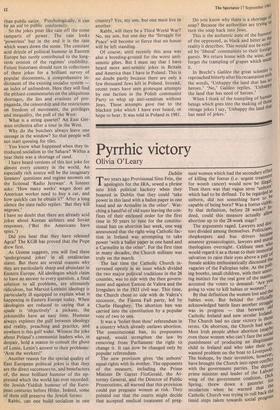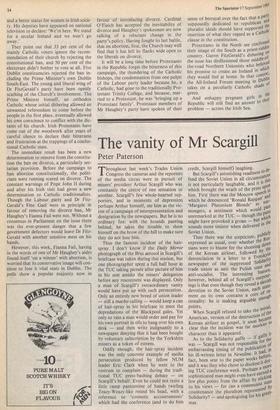Pyrrhic victory
Olivia O'Leary
Dublin
Tw°years ago Provisional Sinn Fein, the apologists for the IRA, sewed a phrase into Irish political hackery when they boasted in Dublin that they could 'take power in this land with a ballot paper in one hand and an Armalite in the other'. Wat- ching a handful of old nuns leaving the con- fines of their enclosed order for the first time in 50 years to vote for the constitu- tional ban on abortion last week, one wag announced that the right-wing Catholic fac- tion in Ireland was attempting to take power 'with a ballot paper in one hand and a Carmelite in the other'. For the first time in many decades, the Church militant was truly on the march. Tw°years ago Provisional Sinn Fein, the apologists for the IRA, sewed a phrase into Irish political hackery when they boasted in Dublin that they could 'take power in this land with a ballot paper in one hand and an Armalite in the other'. Wat- ching a handful of old nuns leaving the con- fines of their enclosed order for the first time in 50 years to vote for the constitu- tional ban on abortion last week, one wag announced that the right-wing Catholic fac- tion in Ireland was attempting to take power 'with a ballot paper in one hand and a Carmelite in the other'. For the first time in many decades, the Church militant was truly on the march.
The last time the Catholic Church in- tervened openly in an issue which divided the two major political traditions in the 26 counties, was to side with the then govern- ment and against Eamon de Valera and the Irregulars in the 1923 civil war. This time, the Church chose to side with de Valera's successor, the Fianna Fail party, led by Charlie Haughey. The abortion ban was carried into the constitution by a popular vote of two to one.
It was a 'holier than thou' referendum in a country which already outlaws abortion. The constitutional ban, its proponents agreed, would strengthen the law by removing from Parliament the right to change it. It can now be changed only by popular referendum.
The new provision gives 'the unborn' equal rights with its mother. The opponents of the measure, including the Prime Minister Dr Garret FitzGerald, the At- torney General, and the Director of Public Prosecutions, all warned that this provision could put pregnant women at risk. They pointed out that the courts might decide that accepted medical treatment of preg-
nant women which had the secondary effect of killing the foetus (i.e. urgent treatin` for womb cancer) would now be Meru; Then there was that vague term 'unborn which had to be defined. To be regarded as unborn, did not something have to be capable of being born? Was a foetus viable' by that definition, before 28 weeks? In- deed, could this measure actually al° abortion up to the 28-week stage? The arguments raged. Lawyers and clne" tors divided among themselves. Politicians, shopkeepers and bus drivers becaritei amateur gynaecologists, lawyers and m0t! theologians overnight. Celibate men who would regard it as a threat to their imrnortaf salvation to raise their eyes above a pair 0. female ankles enthusiastically discussed th,e vagaries of the Fallopian tube. At the P011- mg booths, small children, with their ti0e°. mg instinct for the real gore of the matter,: accosted the voters to demand: 'Are PI' going to vote to kill babies or women?' By that definition the women lost and t1,1,e babies won. But behind the offician,Y acknowledged battle lines another struggl was in progress — that between 01,u Catholic Ireland and new secular Irelann. The Church had no clear victory in those terms. On abortion, the Church had Oa' Most Irish people abhor abortion 011aY.b„el even those women who can't face the saw' .punishment of producing an illegitiMate child in Ireland and who take their un- wanted problem on the boat to Liverpool). The bishops, by their invention, however, have brought the Church into open conflict with the government parties. The denotY prime minister and leader of the Laboti.r
.
wing of the government coalition, plelt Spring, threw down a gauntlet for secularism when he warned that the Catholic Church was trying to roll back the timid steps taken towards social progress
and a better status for women in Irish socie- ty. His deputies have appeared on national television to declare: 'We're here. We stand for a secular Ireland and we won't go away.'
They point out that 33 per cent of the mainly Catholic voters ignore the recom- mendation of their church by rejecting the constitutional ban, and 50 per cent of the electorate didn't bother to vote at all. Five Dublin constituencies rejected the ban in- cluding the Prime Minister's own Dublin South-East. The young and liberal wing of Dr FitzGerald's party have been openly scathing of the Church's involvement. The Prime Minister himself, an orthodox Catholic whose initial dithering allowed an unwanted referendum to come before the people in the first place, eventually allowed his own conscience to conflict with the dic- tates of his church. Irish Protestants have come out of the woodwork after years of careful silence to declare their bitterness and frustration at the trappings of a confes- sional Catholic state.
The immediate result has been a new determination to remove from the constitu- tion the ban on divorce, a particularly sec- tarian provision. Before the campaign to ban abortion constitutionally, the politi- cians were running scared on divorce. The constant warnings of Pope John II during and after his Irish visit had given a new determination to Catholic traditionalists. Though the Labour party and Dr Fitz- Gerald's Fine Gael were in principle in favour of removing the divorce ban, Mr Haughey's Fianna Fail were not. Without a consensus in Parliament on the issue there was the ever-present danger that a few government defectors would leave Dr Fitz- Gerald with another sensitive mess on his hands.
However, this week, Fianna Fail, having in the words of one of Mr Haughey's aides found itself 'on a winner' with abortion, is worried that its conservative image will con- tinue to lose it vital seats in Dublin. The polls show a popular majority now in favour of introducing divorce. Cardinal O'Fiaich has accepted the inevitability of divorce and Haughey's spokesmen are now talking of a reluctant change in the party's policy. Having fought its last battle, that on abortion, first, the Church may well find that it has left its flanks wide open to the liberals on divorce.
It will be a long time before Protestants in the Republic forget the bitterness of this campaign, the thundering of the Catholic bishops, the condemnation from one pulpit of the Labour party leader because he, a Catholic, had gone to the traditionally Pro- testant Trinity College, and because, mar- ried to a Protestant, he was 'bringing up a Protestant family'. Protestant members of Mr Haughey's party have spoken of their
sense of betrayal over the fact that a partY supposedly dedicated to republican and pluralist ideals should have supported the insertion of what they regard as a Catholic clause in the constitution. Protestants in the North see confirmed their image of the South as a priest-ridden country. Garret FitzGerald's dithering on the issue has disillusioned those middle-of: the-road Northern Unionists who believe his promise to create an Ireland in which they would feel at home. In that context' the All-Ireland Forum meeting in Dublin( takes on a peculiarly Catholic shade °I green. And unhappy pregnant girls in th.e Republic will still find an answer to the problem — across the Irish Sea.







































 Previous page
Previous page